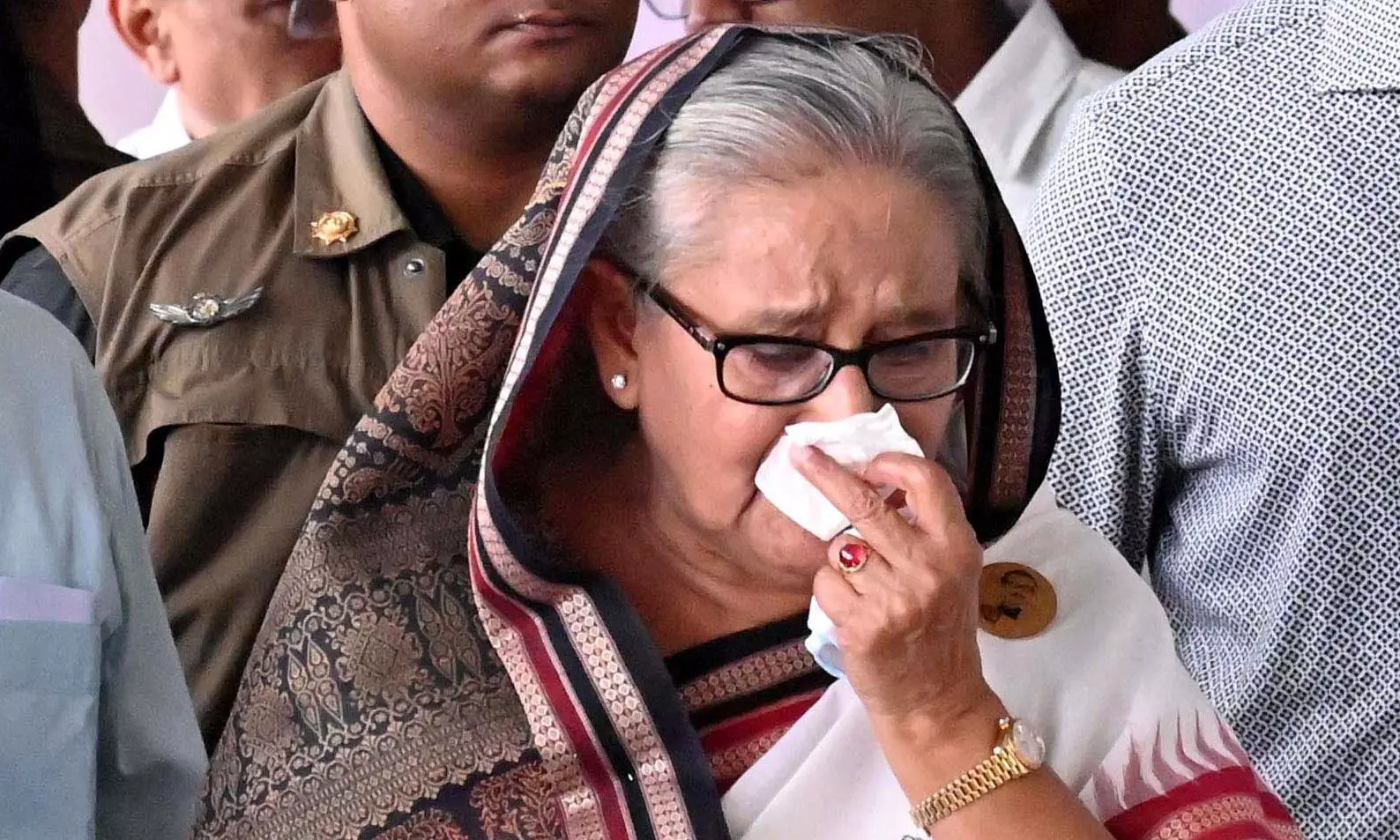Hasina quits, flees to India, Bangla Army takes charge

New Delhi/Dhaka: In a dramatic turn of events seen as a huge geopolitical and strategic setback for a shell-shocked New Delhi, its close friend Sheikh Hasina resigned as Prime Minister of Bangladesh on Monday and fled Dhaka to India after the Army in her country took charge following fresh protests by students and Opposition activists against her 15 year-long rule that has often been marred by allegations of autocratic behaviour.
Media reports said Sheikh Hasina, accompanied by her sister Sheikh Rehana, initially fled in a helicopter from Dhaka and later boarded a Bangladesh Air Force C-130 aircraft that took her on a globally-tracked flight to Hindon airbase near New Delhi, in Ghaziabad district of Uttar Pradesh, on Monday evening. After Ms Hasina’s departure on Monday, Bangladesh Army chief Gen. Waker Uz-Zaman told the nation in a widely-televised press conference that there would be an interim government in the country soon. But this did not stop the protesters who stormed even the official residence of Sheikh Hasina after she had left and looted it.
Till late Monday evening, Sheikh Hasina was reportedly staying at a heavily-guarded safe house within the Hindon airbase that was cordoned off by elite IAF Garud commandos.
Both national security adviser Ajit Doval and Indian Air Force’s Western Air Command head, Air Marshal P.M. Sinha, met the former PM inside the aircraft at the Hindon airbase, with some media reports claiming that she intended to fly to London and had even requested Britain for political asylum.
In New Delhi, external affairs minister S. Jaishankar briefed Prime Minister Narendra Modi on the developments in the neighbouring nation, where Pakistani and Chinese influence is now on the ascendancy. Leader of the Opposition Rahul Gandhi also reportedly met the EAM to discuss the developments in Bangladesh. Later in the evening, Mr Modi, home minister Amit Shah, defence minister Rajnath Singh, Mr Jaishankar, Mr Doval, the three service chiefs and heads of Indian intelligence agencies, including the Research and Analysis Wing (RAW), are said to have deliberated on the developments in Bangladesh at a meeting of the Cabinet Committee on Security. It is learnt that Mr Jaishankar may make a statement on Tuesday in Parliament on the shocking developments in the neighbouring nation.
The countdown for Ms Hasina began after a second wave of violent protests began Sunday that once again led to the deaths of almost 100 protesters. The violence initially began in July after protests there over the proposed quota of up to 30 per cent in government jobs for the families of those who fought in the 1971 war of liberation against Pakistani troops. In fact, tensions had been brewing since January this year when Ms Hasina won a “historic fourth consecutive term in parliamentary elections” that were boycotted by Opposition parties, including the main Opposition, the Bangladesh Nationalist Party (BNP). Overall, this was Sheikh Hasina’s fifth term in power since she was first elected to power from 1996 to 2001 and then continuously since 2009.
Ms Hasina, as Bangladesh PM, was seen as the closest friend of India in the region amid a golden chapter (“sonali adhyaya”) in bilateral ties. She had visited India twice in June, the first time for Prime Minister Narendra Modi’s swearing-in ceremony and then for a bilateral visit just days later. New Delhi had always maintained that “as a close and friend and partner of Bangladesh”, it would continue to support Bangladesh’s vision of a “stable, peaceful and progressive nation”. The ties between India and Bangladesh had been extremely strong when Sheikh Hasina was in power. On the other hand, the Opposition BNP and the Jamaat-e-Islami, which are widely expected to be part of the new ruling dispensation in Dhaka now, have always been openly anti-India and pro-Pakistan for the past several decades.
With tensions already prevalent on India’s borders with both Pakistan and China, uncertainty and instability on the border with Bangladesh is the last thing New Delhi wanted.
Bangladesh had attained independence in December 1971 after Pakistani troops surrendered to the Indian Army after a 13-day India-Pakistan war. Sheikh Hasina’s father Sheikh Mujibur Rahman was the founding father of Bangladesh. Known as “Bangabandhu”, he was killed along with most of his family members by junior officers of the Bangladesh Army in a bloody massacre in 1975. Sheikh Hasina and her sister Sheikh Rehana escaped the massacre as they were not in the country then.
India had earlier said it was “hopeful that the situation in the country would return to normal soon”. New Delhi had also termed the protests in the neighbouring nation as the “internal affair” of Bangladesh. Near midnight on Sunday, India had said: “In view of ongoing developments, Indian nationals are strongly advised against travelling to Bangladesh till further notice. All Indian nationals now in Bangladesh are advised to exercise extreme caution, restrict their movements and remain in contact with the High Commission of India in Dhaka.” When the violence broke out there a few weeks ago, there were about 15,000 Indian nationals residing in Bangladesh, of which 8,500 were students. Subsequently, over 6,700 Indian students studying mostly in medical colleges in Bangladesh had returned to India.

